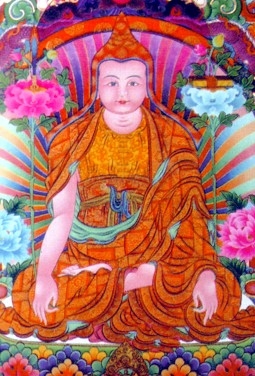Seven Treasuries: Difference between revisions
Jump to navigation
Jump to search
No edit summary |
No edit summary |
||
| Line 1: | Line 1: | ||
[[Image:LongchenRabjam.JPG|frame|'''Longchen Rabjam''']] | [[Image:LongchenRabjam.JPG|frame|'''Longchen Rabjam''']] | ||
The '''Seven Treasures''' or Treasuries are works by the omniscient [[Longchenpa]] which, together with the [[Trilogy of Natural Freedom]], represent the extensive, scholarly or [[pandita]]'s approach. They were not originally intended to be a collection. | The '''Seven Treasures''' or Treasuries ([[Wyl.]]'' mdzod bdun'') are works by the omniscient [[Longchenpa]] which, together with the [[Trilogy of Natural Freedom]], represent the extensive, scholarly or [[pandita]]'s approach. They were not originally intended to be a collection. | ||
* The [[Wish Fulfilling Treasury]] (Tib. ''yishyin dzö'' - yid bzhin mdzod) | * The [[Wish Fulfilling Treasury]] (Tib. ''yishyin dzö'' - yid bzhin mdzod) | ||
Revision as of 09:44, 6 August 2007

The Seven Treasures or Treasuries (Wyl. mdzod bdun) are works by the omniscient Longchenpa which, together with the Trilogy of Natural Freedom, represent the extensive, scholarly or pandita's approach. They were not originally intended to be a collection.
- The Wish Fulfilling Treasury (Tib. yishyin dzö - yid bzhin mdzod)
- The Treasury of Pith Instructions (Tib. mengak dzö - man ngag mdzod)
- The Treasury of Dharmadhatu (Tib. chöying dzö - chos dbyings mdzod)
- The Treasury of Philosophical Tenets (Tib. drubta dzö - grub mtha' mdzod)
- The Treasury of the Supreme Vehicle (Tib. tekchok dzö - theg mchog mdzod)
- The Treasury of Word and Meaning (Tib. tsik dön dzö - tshig don mdzod)
- The Treasury of the Natural State (Tib. neluk dzö - gnas lugs mdzod)
History
Most of the Seven Treasuries were composed at Longchenpa's hermitage at Gangri Thökar in Central Tibet.


According to the oral tradition of villagers in Bumthang in Bhutan, some of the most important parts of of the Seven Treasures were written by Longchenpa on the rock or 'throne' (bzhugs khri) above Tharpaling Monastery in Bhutan. The rock provides a splendid panoramic view of different mountain ranges in the Himalayas.